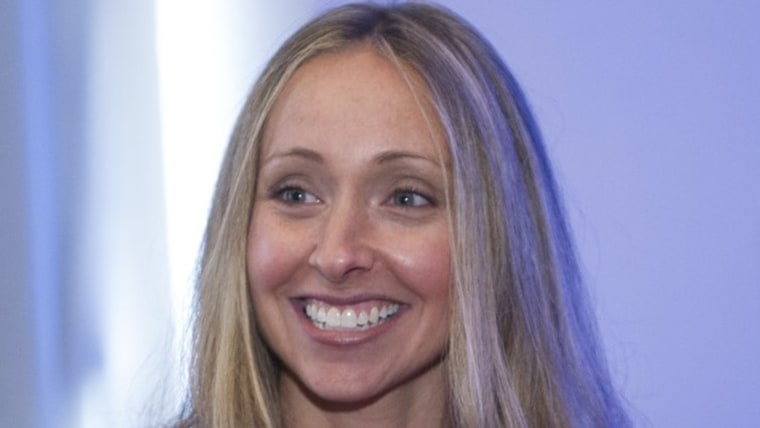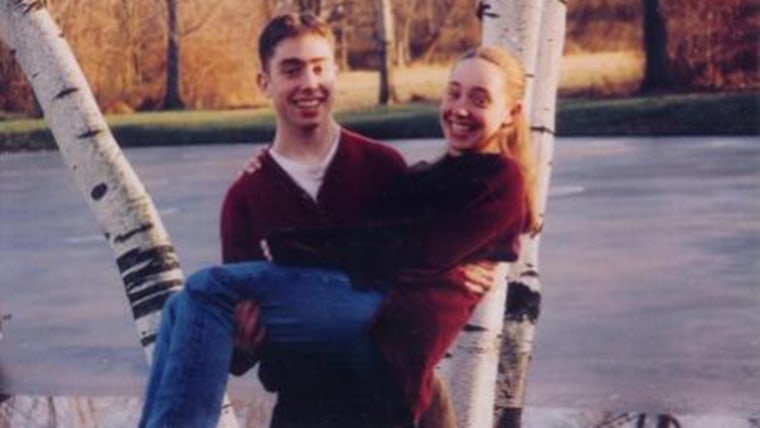September is National Suicide Prevention Awareness Month, with Sept. 10 marking World Suicide Prevention Day. If you or someone you know is at risk of suicide, please call the U.S. National Suicide Prevention Lifeline at 800-273-8255, text TALK to 741741 or go to SpeakingOfSuicide.com/resources for additional resources.
Alison Malmon's 22-year-old brother Brian ended his life after a hidden struggle with mental illness. She shared her story with TODAY.
Brian died on March 24, 2000, by suicide. The best diagnosis we have for him was schizoaffective disorder. He went through college really struggling with his mental health and we had no idea.
Brian was four years and four days older than me. He was my big brother and someone I looked up to throughout my childhood. We got along so well that we irritated each other in a way only siblings can.
My parents separated when I was 8 and Brian was 12. So for about 10 years before Brian died, the two of us traveled back and forth between my mom’s house and my dad’s house. We had to deal with that together. In so many ways, he was the person who knew me the best and the person who I really felt most close to.
Brian was at the top of the class in high school. He was popular and a talented writer. He got into his top choice college, Columbia University in New York, and was a dean’s list student every semester. Brian was really well rounded, just incredible.
He first started experiencing mental illness during his freshman year at Columbia. He started hearing voices and feeling depressed. At that point, though, Brian hid it. He masked the symptoms in the way so many people who struggle do, thinking it was his fault, thinking he was the only one.
So many students are struggling even though they look spectacular on the outside. My mom is a clinical social worker and we come from a really supportive family. But Brian did such a brilliant job masking it that we could not tell. For the almost four years that he had lived it, we had no idea.
He finally sought help from the counseling services at Columbia in his senior year. The therapist recommended he come home for a weekend to relax and de-stress and that was when my mom picked up that Brian was really struggling. He stayed at home and started a variety of intensive therapies and treatments.
His time on campus — dealing with this by himself, thinking it was his fault — made his depression spiral down so far that by the time he did get help, it was too late.
The biggest change in him was his personality. He had been a very outgoing, gregarious, funny person, but he became very withdrawn. He would stay in his room and didn’t want to come out for dinner.
There were times when we went to family Thanksgiving and Brian couldn’t muster up the energy to go to see family members and he didn’t want them to know what he was going through.
My older brother kind of became my younger brother. I had to coax him out and I felt like I was taking care of him in a way that he had taken care of me years prior.
I was a freshman in college when he died. It was an unusually nice Friday in March, so I had been outside studying with some of my roommates. When I came inside, I had a message from my mom. She said, “It’s mommy, call me.” She never called herself “mommy” and I never called her “mommy,” so it was the first indication to me there was something going on.
I called her back and got the news. He was at home when he died.
We shouldn’t use the phrase “committed suicide.” There’s so much stereotyping around mental illness and suicide that separates it from other health issues. You don’t commit a heart attack, you don’t commit cancer. When somebody dies by suicide, they’re dying from a mental illness.
We have such a need in our community, in our language, to talk about mental health in the same way we talk about all other health issues. We don’t blame people who have diabetes; we don’t blame people who get cancer.
When Brian started struggling with his mental health, he literally thought he was the only person who was dealing with that on campus because everybody else was having “the best time of their lives” and partying. There was no conversation about mental illness.
We learned only after the fact that Brian’s friends at school had noticed some changes in him. But he wasn’t saying anything, so they didn’t say anything. They wanted to respect him; they didn’t know what to say.
There were opportunities for his friends to jump in and say, “Brian, I’m worried about you. Are you OK? Can I walk you over to the counseling center?”

There was incredible need for students to be educated about what to look for in friends and how to be a friend to somebody who is struggling and how to connect a friend with resources for help.
What I launched with Active Minds is what I thought Brian needed from the very beginning: a student-to- student conversation about these issues. As a freshman, he needed to hear from a senior, “Hey, I’ve been through that, too, and I’m doing OK.” But Brian saw the diagnosis of his mental illness as a life sentence.
There’s help available. The earlier you seek treatment, the more likely you are to recover. Most importantly: It’s not your fault, and there is hope.
Alison Malmon is the founder of Active Minds, a Washington-based nonprofit organization that helps high school and college students speak openly about mental health.

